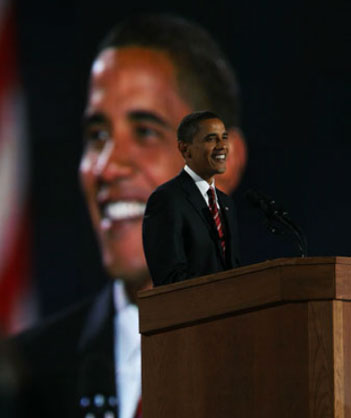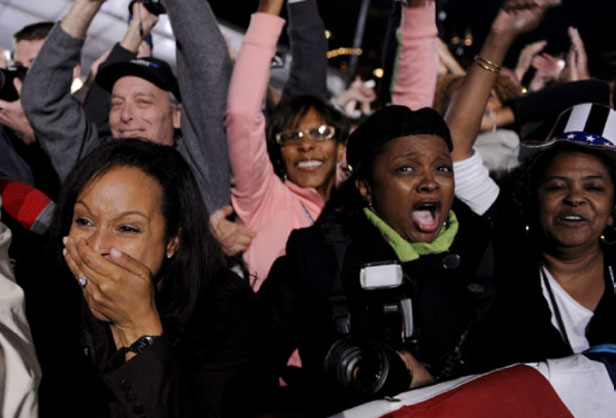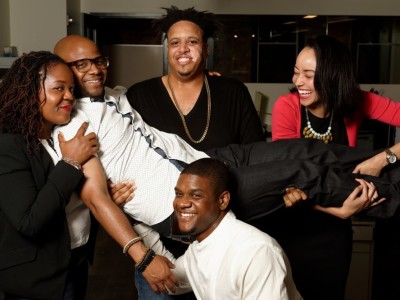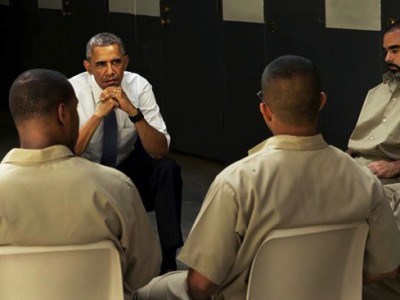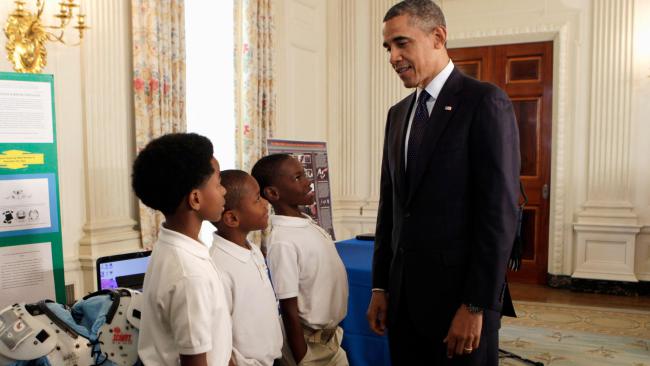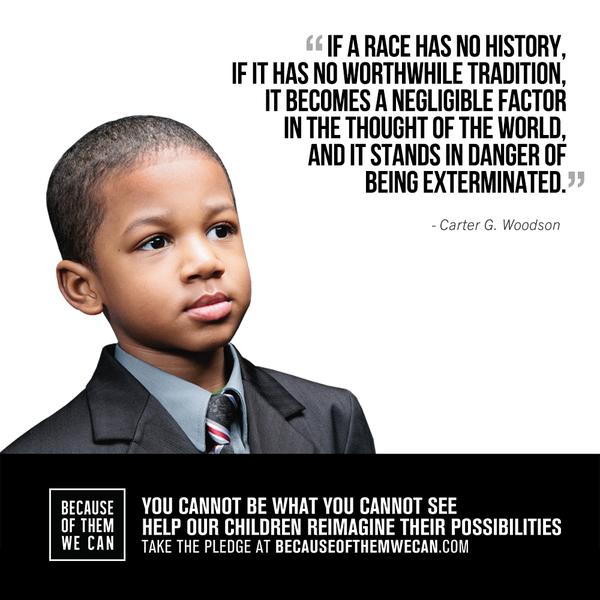“It’s only when you hitch your wagon to something larger than yourself that you will realize your true potential.” – Barack Obama
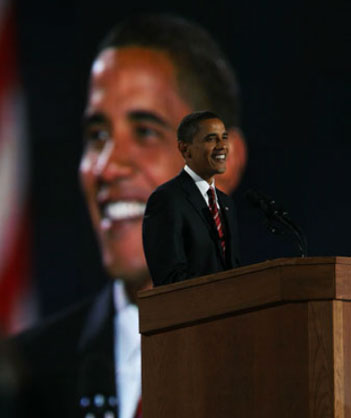 The 44th and current president of the United States, Barack Obama was born August 4, 1961 in Honolulu, Hawaii. He was a civil rights lawyer before pursuing a political career, first as Illinois State Senator, and later as the first African-American president of the United States. President Obama continues to enact policy changes in response to the issues of health care and economic crisis.
The 44th and current president of the United States, Barack Obama was born August 4, 1961 in Honolulu, Hawaii. He was a civil rights lawyer before pursuing a political career, first as Illinois State Senator, and later as the first African-American president of the United States. President Obama continues to enact policy changes in response to the issues of health care and economic crisis.
President of the United States. Born Barack Hussein Obama on August 4, 1961, in Honolulu, Hawaii. Obama’s mother, Ann Dunham, grew up in Wichita, Kansas, where her father worked on oil rigs during the Depression. After the Japanese attack on Pearl Harbor, Dunham’s father, Stanley, enlisted in the service and marched across Europe in Patton’s army. Dunham’s mother, Madelyn, went to work on a bomber assembly line. After the war, the couple studied on the G.I. Bill, bought a house through the Federal Housing Program and, after several moves, landed in Hawaii.
Obama’s father, Barack Obama, Sr., was born of Luo ethnicity in Nyanza Province, Kenya. The elder Obama grew up herding goats in Africa, eventually earning a scholarship that allowed him to leave Kenya and pursue his dreams of college in Hawaii. While studying at the University of Hawaii in Manoa, Obama, Sr. met fellow student, Ann Dunham, They married on February 2, 1961. Barack was born six months later.
Obama’s parents separated when he was two years old, later divorcing. Obama, Sr. went on to Harvard to pursue Ph.D. studies, and then returned to Kenya in 1965. In 1966, Dunham married Lolo Soetoro, another East–West Center student from Indonesia. A year later, the family moved to Jakarta, Indonesia, where Obama’s half-sister Maya Soetoro Ng was born. Several incidents in Indonesia left Dunham afraid for her son’s safety and education so, at the age of 10, Barack was sent back to Hawaii to live with his maternal grandparents. His mother and sister later joined them.
While living with his grandparents, Obama enrolled in the esteemed Punahou Academy, excelling in basketball and graduating with academic honors in 1979. As one of only three black students at the school, Obama became conscious of racism and what it meant to be African-American. He later described how he struggled to reconcile social perceptions of his multiracial heritage with his own sense of self. “I began to notice there was nobody like me in the Sears, Roebuck Christmas catalog…and that Santa was a white man,” he said. “I went to the bathroom and stood in front of the mirror with all my senses and limbs seemingly intact, looking the way I had always looked, and wondered if something was wrong with me.”
Obama also struggled with the absence of his father, who he saw only once more after his parents divorced, in a brief 1971 visit. “[My father] had left paradise, and nothing that my mother or grandparents told me could obviate that single, unassailable fact,” he later reflected. “They couldn’t describe what it might have been like had he stayed.” Obama, Sr. eventually lost his legs in an automobile accident, also losing his job as a result. In 1982, he died in yet another car accident while traveling in Nairobi. Obama, Jr. was 22 years old when he received
the news of his father’s passing. “At the time of his death, my father remained a myth to me,” Obama said, “both more and less than a man.”
After high school, Obama studied at Occidental College in Los Angeles for two years. He then transferred to Columbia University in New York, graduating in 1983 with a degree in political science. After working in the business sector for two years, Obama moved to Chicago in 1985. There, he worked on the South Side as a community organizer for low-income residents in the Roseland and the Altgeld Gardens communities.
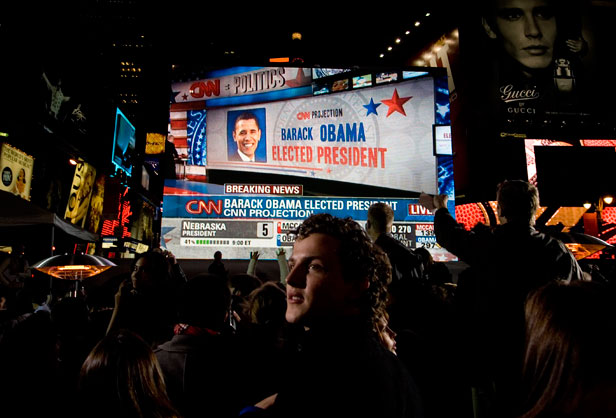 It was during this time that Obama, who said he “was not raised in a religious household,” joined the Trinity United Church of Christ. He also visited relatives in Kenya, which included an emotional visit to the graves of his biological father and paternal grandfather. “For a long time I sat between the two graves and wept,” Obama said. “I saw that my life in America—the black life, the white life, the sense of abandonment I felt as a boy, the frustration and hope I’d witnessed in Chicago—all of it was connected with this small plot of earth an ocean away.”
It was during this time that Obama, who said he “was not raised in a religious household,” joined the Trinity United Church of Christ. He also visited relatives in Kenya, which included an emotional visit to the graves of his biological father and paternal grandfather. “For a long time I sat between the two graves and wept,” Obama said. “I saw that my life in America—the black life, the white life, the sense of abandonment I felt as a boy, the frustration and hope I’d witnessed in Chicago—all of it was connected with this small plot of earth an ocean away.”
Obama returned from Kenya with a sense of renewal, entering Harvard Law School in 1988. The next year, he met Michelle Robinson, an associate at Sidley & Austin law firm in Chicago. She was assigned to be Obama’s adviser during a summer internship at the firm, and soon the couple began dating. In February 1990, Obama was elected the first African-American editor of the Harvard Law Review, and he graduated magna cum laude in 1991.
After law school, Obama returned to Chicago to practice as a civil rights lawyer, joining the firm of Miner, Barnhill & Galland. He also taught at the University of Chicago Law School, and helped organize voter registration drives during Bill Clinton’s1992 presidential campaign. On October 3, 1992, he and Michelle were married. They moved to Kenwood, on Chicago’s South Side, and welcomed two daughters: Malia (born 1998) and Sasha (born 2001).
Obama published his autobiography in 1995 Dreams From My Father: A Story of Race and Inheritance. The work received high praise from literary figures such as Toni Morrison and has since been printed in 10 languages, including Chinese, Swedish and Hebrew. The book had a second printing in 2004, and is currently being adapted into a children’s version. The 2006 audiobook version of Dreams, which was narrated by Obama, received a Grammy award for Best Spoken Word Album.
Obama’s advocacy work led him to run for the Illinois State Senate as a Democrat. He won election in 1996. During these years, Obama worked with both Democrats and Republicans in drafting legislation on ethics, expanded health care services, and early childhood education programs for the poor. He also created a state earned-income tax credit for the working poor. Obama became chairman of the Illinois Senate’s Health and Human Services Committee as well, and after a number of inmates on death row were found innocent, he worked with law enforcement officials to require the videotaping of interrogations and confessions in all capital cases.
Following the 9/11 attacks in 2001, Obama was an early opponent of President Bush’s push to war with Iraq. Obama was still a state senator when he spoke against a resolution authorizing the use of force against Iraq during a rally at Chicago’s Federal Plaza in October 2002. “I am not opposed to all wars. I’m opposed to dumb wars,” he said. “What I am opposed to is the cynical attempt by Richard Perle and Paul Wolfowitz and other arm-chair, weekend warriors in this Administration to shove their own ideological agendas down our throats, irrespective of the costs in lives lost and in hardships borne.” Despite his protests, the war with Iraq began in 2003.
Obama, encouraged by poll numbers, decided to run for the U.S. Senate open seat vacated by Republican Peter Fitzgerald. In the 2004 Democratic primary, he won 52 percent of the vote, defeating multimillionaire businessman Blair Hull and Illinois Comptroller Daniel Hynes. That summer, he was invited to deliver the keynote speech in support of John Kerry at the 2004 Democratic National Convention in Boston. Obama emphasized the importance of unity, and made veiled jabs at the Bush administration and the diversionary use of wedge issues.
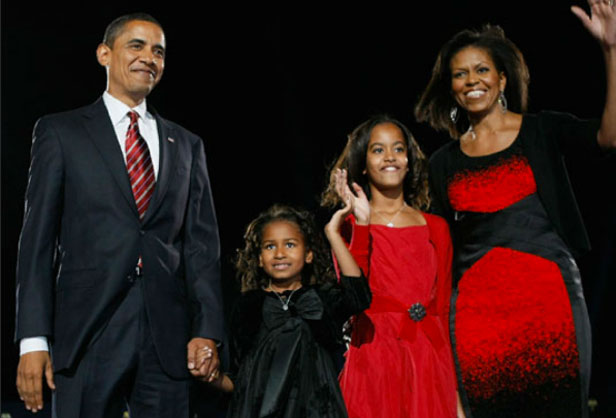 Sworn into office January 4, 2005, Obama partnered with Republican Senator Richard Lugar of Indiana on a bill that expanded efforts to destroy weapons of mass destruction in Eastern Europe and Russia. Then, with Republican Senator Tom Corburn of Oklahoma, he created a website that tracks all federal spending. Obama also spoke out for victims of Hurricane Katrina; pushed for alternative energy development; and championed improved veterans’ benefits.
Sworn into office January 4, 2005, Obama partnered with Republican Senator Richard Lugar of Indiana on a bill that expanded efforts to destroy weapons of mass destruction in Eastern Europe and Russia. Then, with Republican Senator Tom Corburn of Oklahoma, he created a website that tracks all federal spending. Obama also spoke out for victims of Hurricane Katrina; pushed for alternative energy development; and championed improved veterans’ benefits.
His second book, The Audacity of Hope: Thoughts on Reclaiming the American Dream, was published in October 2006. The work discussed Obama’s visions for the future of America, many of which became talking points for his eventual presidential campaign. Shortly after its release, it hit No. 1 on both the New York Times and Amazon.com bestsellers lists. n February 2007, Obama made headlines when he announced his candidacy for the 2008 Democratic presidential nomination. On November 4th, 2008, Barack Obama defeated Republican presidential nominee John McCain for the position of U.S. President, 52.9 percent to 45.7 percent. On January 20, 2009, Obama became the 44th president of the United States—and the first African-American to hold this office. He won re-election in November, 2012!
When Obama took office, he inherited a global economic recession; two on-going foreign wars; and the lowest international favorability rating for the United States ever. He campaigned on an ambitious agenda of financial reform, alternative energy, and reinventing education and health care—all while bringing down the national debt. Because these issues were intertwined with the economic well-being of the nation, he believed all would have to be undertaken simultaneously. During his inauguration speech, Obama summarized the situation by saying, “Today I say to you that the challenges we face are real. They are serious and they are many. They will not be met easily or in a short span of time. But know this, America: They will be met.”
Today we celebrate President Barack Obama for making history!

